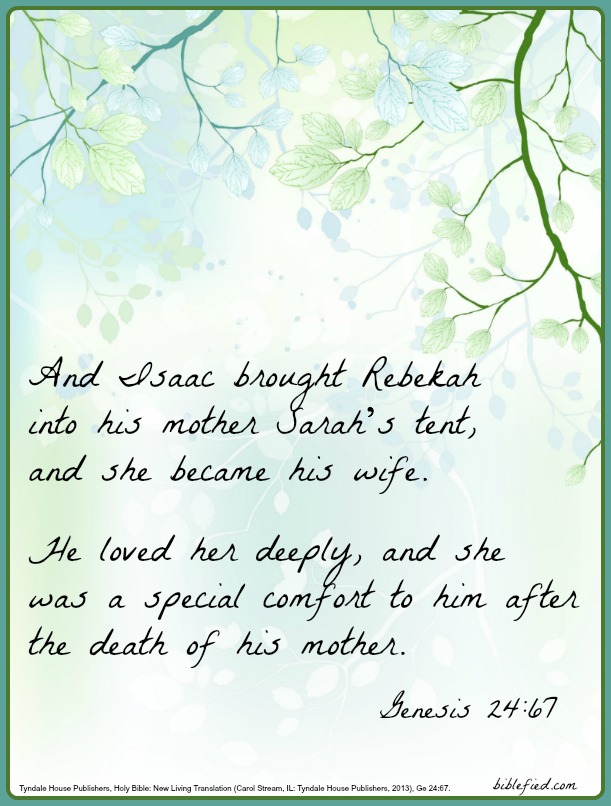|
|
Genesis Chapter 24
In Genesis Chapter 24 we see Abraham gets a bride from his relatives for his son Isaac. It's remarkable how it occurs and could only have been orchestrated by God.

Daily Bible Study Questions for Genesis Chapter 24
Day One
1. God is the main actor or influence in this story. How does Abraham, Abraham's servant, Laban, and Buethel regard the role of God in this story according to the verses below?
Abraham in verses 3 and 7
Abraham's servant in verses 9, 12, 27, 35, 40, 42, 44, 48, and 56
Laban and Buethel in verses 31, 50, and 51
2. The first recorded prayer in the Bible for something specific is in verse 12 where Abraham's servant asks for God to identify the woman He had appointed to be Isaac's wife. This was not a prayer for himself but for his master; if fact, it was for his master's son and was toward the promise of God for His provision of his master's descendants.
Some may wonder - "How can I know that God might grant a specific thing I ask Him for in my prayer?
God's Word is our guide to understand what He might provide for us. We can't expect that God will allow us something that's contrary to His Word. A great thing for Christ followers to do is to find the promises of God in the Bible and claim them in prayer.
However, like Abraham, we must be patient and wait for His timing and provision. God is not a magic genie in a bottle that grants our wishes. He is sovereign and knows what's best for us; and in that regard, we can't always get what we want.
Jesus taught us that God knows what we need before we even ask Him for it (Matthew 6:8). We need to pray and rely on God while remembering that He knows what we need and He has provided us eternal life which is more valuable than anything else He could possible give us.
Examine your prayer life. How often do you pray to specifically ask for something you need? Or, do you often start your prayers by praising and thanking God and petitioning Him on behalf of others before you ask for yourself?
Day Two
3. In verse 49, Abraham's servant says he will go elsewhere if Laban and Bethel won't show kindness to his master. Where else could he have gone and still have been faithful to his master's guidance given in verses two through nine?
Day Three
4. Rebekah was very hospitable and a hard worker. She not only offered the servant a drink when asked, but then offered to water his ten camels.
According to The IVP Bible Background Commentary on the Old Testament,
- camels can drink about 25 gallons of water; and,
- an average water jug held no more than 3 gallons.
So Rebekah graciously offered to draw roughly 250 gallons of water so that the camels "would have enough to drink" according to Genesis chapter 24, verse 19.
25 gallons x 10 camels = 250 gallons
250 gallons / 3 gallons = 83 trips
It seems it would have been necessary for Rebekah to refill her water jug at least 83 times to provide enough water for the ten camels.
A gallon of water weighs about 8.3 pounds, so three gallons weighs about 25 pounds. Therefore, it's likely Rebekah offered to haul 25 pounds of water 83 times to provide enough water for the ten camels.
Rebekah's remarkable offer of hospitality was unusually gracious. It demonstrated to Abraham's servant that she was the one appointed by God to be Isaac's bride (verse 14).
What ways can you think of to offer hospitality to strangers that will glorify God?
5. The last recorded words of Abraham in the Bible are provided in verses 6, 7, and 8 of Genesis chapter 24. They reflect God's promise from 25 years before this which is recorded in Genesis chapter 12. Abraham had remained focused in faith on God's promise of the Promised Land to his offspring.
How does Rebekah also act in faith and how does she play into the story of the promise of God?
Day Four
6. What can we say about the character of Abraham's servant from Genesis chapter 24?
Day Five
7. Sarah had Isaac when she was 90 and she died at the age of 127. So now Abraham seeks a bride for his only son when Isaac was 37 years old. There's no indication of why it had taken so long, or if there were any previous attempts.
Still, by sending his servant to find a bride for his son Isaac, Abraham acted on the promise of God that he would have innumerable descendants and they would inherit the Promised Land. Undoubtedly, Abraham wished to have Isaac live under and by the promises and provision of God.
In 2006, Josh McDowell wrote a book called The Last Christian Generation. He called for a new process-driven and intergenerational approach to Christian education similar to the ancient Hebrew model. He called for a spiritual formation process which focuses the results of learning not just on knowing biblical truth, but more so on the relational response of having learned biblical truth.
Today in America, we've seen a decline in faith over several generations. McDowell's concerns are realized when we see the Barna Group reports that show there's been a steady decline over the past several generations in the beliefs that:
- Jesus was an actual person who actually lived
- Jesus was sinless
- Jesus was God
What can we do to help ensure that we'll have godly descendants?
Click here to compare your answers for this Bible study lesson.
We pray this Bible Study on Genesis Chapter 24 has been a blessing to you.
